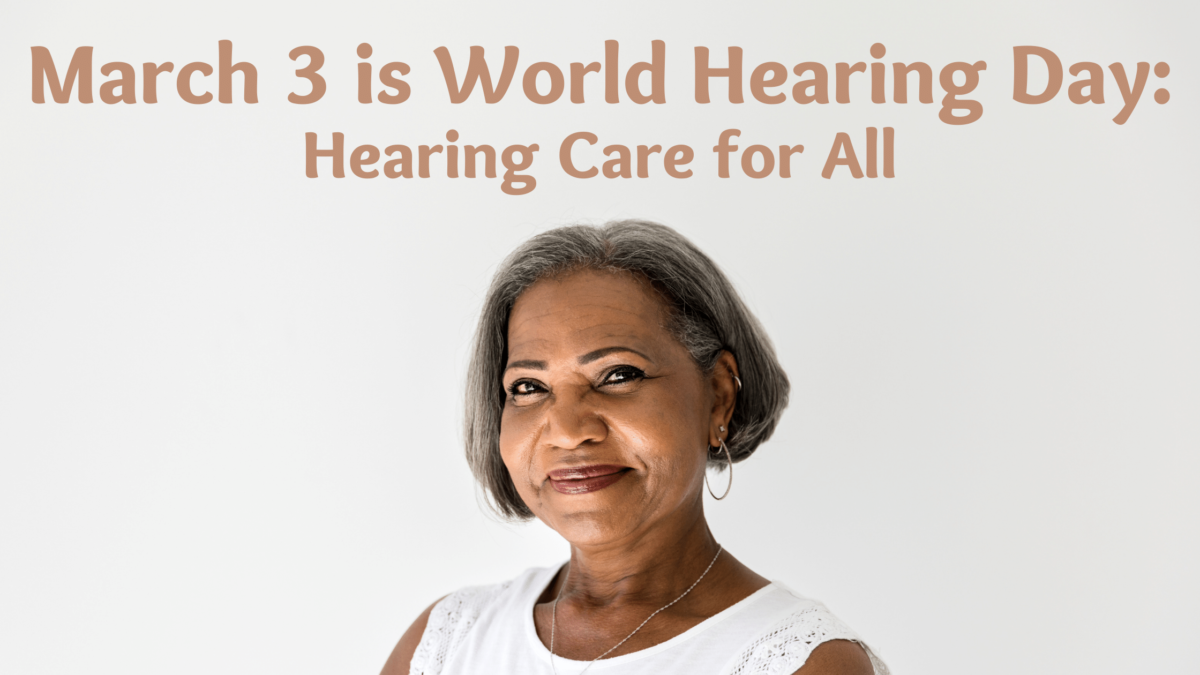
March 3 is World Hearing Day: Hearing Care for All
Happy World Hearing Day! March 3rd has been designated World Hearing Day 2021 in order to raise awareness about hearing health issues at all stages of life. This past year we’ve really learned the many ways that healthcare is a global issue and this World Hearing Day’s theme is “Hearing Care for All!” a call for access to hearing health support.
Bolstering this theme is “Screen. Rehabilitate. Communicate.” highlighting three critical action areas for taking action to address hearing impairment worldwide. This year World Hearing Day launches with theWorld Report on Hearing, a call to action for policymakers and a public awareness campaign for individuals. Let’s take a closer look at how this year’s message helps expand hearing healthcare.
Screen
The first step World Hearing Day is advocating for is increased access to screening for hearing loss and other issues within the auditory system. Having regular access to hearing testing is important at all stages of life. Hearing loss is best treated when it is detected and addressed early. The longer hearing loss goes unattended to the more difficult hearing becomes and the deeper impact it can have on a person’s health and quality of life.
This is especially true for the very young. In babies and young children, hearing is critical for normal development, learning and communication. Undetected or unaddressed hearing loss in the very young can lead to developmental problems or delays. When hearing loss is found and treated early it can be accommodated in a child’s learning, facilitating better communication and easier comprehension.
Early screenings for hearing loss are very important, but it is also necessary to make hearing testing available at all stages of life. Hearing loss affects people in every age demographic and our risk of hearing loss increases significantly as we age. Frequent screening needs to become normalized for those at high risk for hearing loss and in adults over age 65.
Rehabilitate
Better access to hearing testing is just part of increasing hearing health on a global level. When hearing loss is detected, rehabilitation needs to be the next step. Rehabilitation often takes the form of an assistive device like hearing aids. While most forms of hearing loss cannot be reversed or cured, treating hearing loss can effectively improve hearing and comprehension.
Untreated hearing loss places tremendous stress on our cognitive performance as the brain allocates outsized attention and mental resources to compensating for hearing loss. When left unaddressed hearing loss fundamentally reshapes the way our brain processes incoming sound. The further impaired hearing gets from normal hearing, the deeper change has occurred and the harder it is to rehabilitate. This is a huge part of why early response and treatment is so important to recognize for hearing loss.
While early treatment is the best course of action, hearing loss can be effectively treated at almost every stage with positive results. Studies have even found that treating hearing loss in those with advanced dementia improves cognitive performance. No matter what stage hearing issues are at, pursuing hearing rehabilitation is a smart course of action that can enrich a person’s life.
Communicate
The final platform for World Hearing Day holds multiple meanings. First, it advocates for better public health information around hearing loss. Facts about hearing health and hearing loss prevention are sadly under-distributed leading to widespread misconceptions about hearing loss. Most hearing loss is preventable, and involves recognizing and protecting one’s self from excess noise exposure. Teaching people at all stages of life how to prevent hearing damage and how to recognize hearing loss is a key factor in increasing global response to hearing impairment.
“Communicate” also means increasing access to communication for those living with hearing issues. Hearing loss has been shown to decrease quality of life and can isolate people from their networks of friends and family as well as hold a person back at school or work. Accommodations for hearing loss need to become increasingly normalized and widespread. From live captioning for events and meetings, to greater financial assistance programs for hearing aid access, connecting those with hearing loss to better communication improves all our lives by creating richer connections.
Our Comprehensive Hearing Health Services
Here in our little corner of the globe, we’re open and ready to help you screen, rehabilitate and communicate. If you’ve noticed changes in your hearing or if it is time for your next hearing exam, get in touch with us today!
